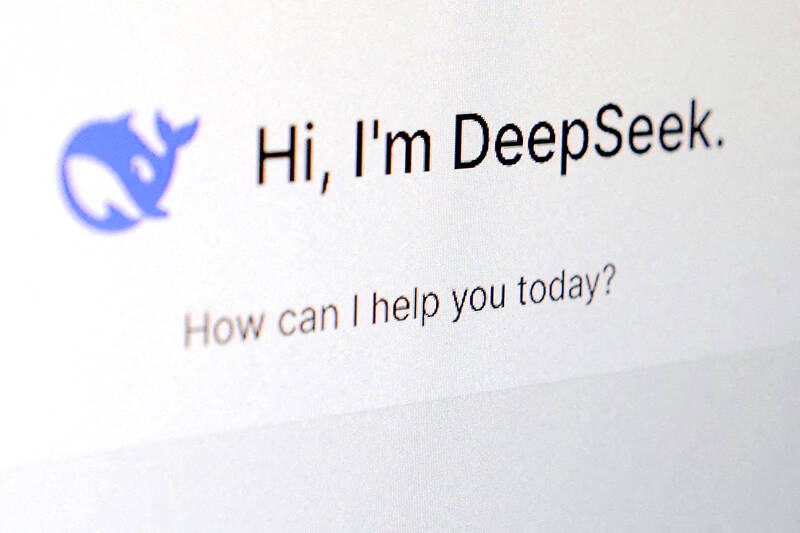All government agencies would be prohibited from using DeepSeek (深度求索), a Chinese artificial intelligence (AI) model, to protect national information security, Premier Cho Jung-tai (卓榮泰) said yesterday.
The announcement came after the Ministry of Digital Affairs on Friday last week said that government agencies should not use DeepSeek.
There are concerns regarding the DeepSeek chatbot, including potential breaches of copyright laws in its data acquisition and ideological censorship, as well as data bias in its language model training, Cabinet spokeswoman Michelle Lee (李慧芝) quoted Cho as saying in a news release.

Photo: Reuters
Public universities and research institutions can use DeepSeek if they acquire the proper approval, Lee said.
However, universities and research institutions should download the model to computers that do not contain personal data for safety, National Science and Technology Council Minister Wu Cheng-wen (吳誠文) said.
Cho called on Minister Without Portfolio Lin Min-hsin (林明昕), National Development Council Minister Paul Liu (劉鏡清) and Wu to expedite and bolster regulations around AI and data governance so that government agencies and private sector entities have clear guidelines regarding AI.
Meanwhile, Chinese Nationalist Party (KMT) Legislator Lee Yen-hsiu (李彥秀) urged the government to clarify the scope of its ban on DeepSeek, while ruling Democratic Progressive Party (DPP) lawmakers called for greater caution.
Lee Yen-hsiu on Saturday criticized the digital ministry for failing to provide a sufficient explanation when it announced the ban.
The ban applies to employees of central and local government agencies, public schools, state-owned enterprises and semi-official organizations, as well as entities working on critical infrastructure projects and in government-endowed foundations, the ministry said.
It did not provide further details related to enforcement or the specifics of the restrictions.
Lee Yen-hsiu questioned the Principles on Restricting the Use of Products That Endanger National Cyber Security issued by the Executive Yuan in 2019, which formed the basis of the ban, adding that its vast scope could have unintended consequences.
The broad restrictions could negatively affect academic research and student learning, she said.
Some DPP lawmakers supported the ban, stressing Taiwan’s vulnerability to military and cybersecurity threats from China.
DPP Legislator Wang Ting-yu (王定宇) urged Taiwan to exercise greater caution on the service.
He also called on businesses and individuals in the private sector to be more vigilant on cybersecurity and avoid using DeepSeek products if there are security risks.
Last week, the Italian Data Protection Agency ordered DeepSeek to block its AI model in the country over concerns about its use of personal data, while US and Australian officials have also raised privacy concerns.
DeepSeek has also roiled the global tech market, with reports claiming it rivals US AI products despite using inferior chips amid a ban on the sale of the most advanced chips to Chinese companies.

Taiwanese can file complaints with the Tourism Administration to report travel agencies if their activities caused termination of a person’s citizenship, Mainland Affairs Council Minister Chiu Chui-cheng (邱垂正) said yesterday, after a podcaster highlighted a case in which a person’s citizenship was canceled for receiving a single-use Chinese passport to enter Russia. The council is aware of incidents in which people who signed up through Chinese travel agencies for tours of Russia were told they could obtain Russian visas and fast-track border clearance, Chiu told reporters on the sidelines of an event in Taipei. However, the travel agencies actually applied

Japanese footwear brand Onitsuka Tiger today issued a public apology and said it has suspended an employee amid allegations that the staff member discriminated against a Vietnamese customer at its Taipei 101 store. Posting on the social media platform Threads yesterday, a user said that an employee at the store said that “those shoes are very expensive” when her friend, who is a migrant worker from Vietnam, asked for assistance. The employee then ignored her until she asked again, to which she replied: "We don't have a size 37." The post had amassed nearly 26,000 likes and 916 comments as of this

New measures aimed at making Taiwan more attractive to foreign professionals came into effect this month, the National Development Council said yesterday. Among the changes, international students at Taiwanese universities would be able to work in Taiwan without a work permit in the two years after they graduate, explainer materials provided by the council said. In addition, foreign nationals who graduated from one of the world’s top 200 universities within the past five years can also apply for a two-year open work permit. Previously, those graduates would have needed to apply for a work permit using point-based criteria or have a Taiwanese company

The Shilin District Prosecutors’ Office yesterday indicted two Taiwanese and issued a wanted notice for Pete Liu (劉作虎), founder of Shenzhen-based smartphone manufacturer OnePlus Technology Co (萬普拉斯科技), for allegedly contravening the Act Governing Relations Between the People of the Taiwan Area and the Mainland Area (臺灣地區與大陸地區人民關係條例) by poaching 70 engineers in Taiwan. Liu allegedly traveled to Taiwan at the end of 2014 and met with a Taiwanese man surnamed Lin (林) to discuss establishing a mobile software research and development (R&D) team in Taiwan, prosecutors said. Without approval from the government, Lin, following Liu’s instructions, recruited more than 70 software